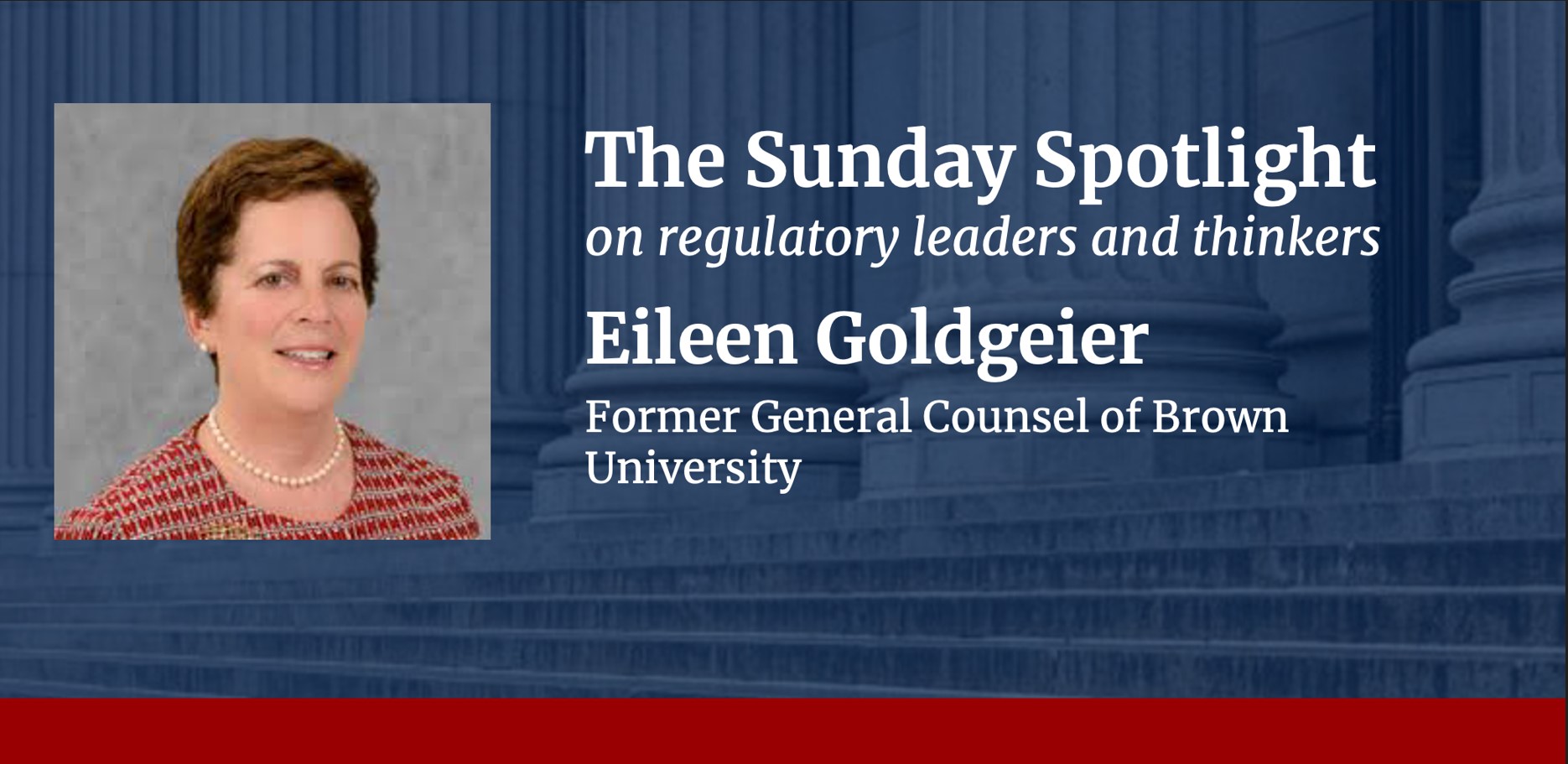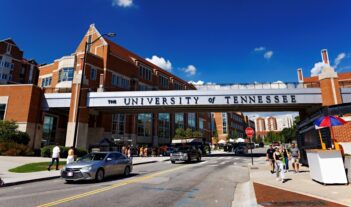
Eileen Goldgeier looks back on her career in higher education law.
In discussion with The Regulatory Review, Eileen Goldgeier, the former General Counsel of Brown University, reflects on her illustrious career in higher education law.
From start to finish, Goldgeier’s career coincided with regulatory transformation in higher education. When she first started in the early 1990s, a wave of regulation—from environmental protection to sexual assault prevention—added significant legal responsibilities for universities. Today, higher education lawyers have been grappling with a new set of regulatory challenges, such as COVID-19, name, image and likeness (NIL) deals for student athletes, and the shifting legal landscape around affirmative action.
In this Spotlight, Goldgeier—drawing on over 30 years in higher education law—discusses the breadth and creativity of a university lawyer’s work. Because general counsels serve as what some people have called the “conscience” of their universities, Goldgeier contends that the general counsel’s office at a university must be built on trust, collaboration, and integrity. Beyond supporting university leadership in strategic decision making, general counsels also develop know-your-rights resources and trainings for the broader university community. Upon reflection, Goldgeier concludes that upholding the mission of higher education everyday was the most rewarding aspect of her job.
Goldgeier retired recently as the Vice President and General Counsel of her alma mater Brown University. As an undergraduate at Brown, she earned her bachelor’s degree in environmental studies followed by her J.D. at Emory University School of Law. After practicing at a law firm, she entered the higher education legal space, serving in the general counsel offices at Johns Hopkins University, the University of North Carolina at Wilmington, and North Carolina State University before returning to Brown.
The Regulatory Review is pleased to share the following interview with Eileen Goldgeier.
The Regulatory Review: What does the general counsel for a university do? What drew you to the role?
Goldgeier: The general counsel is the chief legal officer of the university. The job entails hiring and managing the attorneys and legal staff; evaluating and hiring outside counsel; developing and managing a budget; serving as a senior legal officer of the university; providing advice and counsel to the board, the president, senior officers, and staff; identifying legal trends; and managing risk.
The most important attribute of a general counsel is developing and keeping the trust of your clients. As one of the attorneys in a previous office said, without attorney-client trust, it is like clapping with one hand. Finally, some people have described the general counsel’s role as the conscience of the university. Integrity is paramount.
I was drawn to higher education law because the law firm life bored me, and I wanted to have a broader practice. I like the question, “what does a university attorney do,” because the answer is everything from A to Z: A is for antitrust, affirmative action, and athletics; B is for bankruptcy; C is for COVID-19, construction, copyright, and contracts; D is for discrimination; E is for environmental law, ethics, and encampments; F is for financial aid; G is for grievances; … and Z is for zoning. No day is the same. If you get bored easily, are creative in problem solving, and love learning new subject matters areas, then higher education law is for you.
TRR: The start of your legal career in the 1990s coincided with the passage of key legislation on higher education. How would you describe the experience of entering higher education law during this transformative time?
Goldgeier: When I started as a staff attorney in the Office of the General Counsel (OGC) at Johns Hopkins University in January 1992, I did not understand the depth and breadth of the higher education practice. At that time, the federal government was investigating those universities that received the most federal grant money in the country, including Johns Hopkins. These investigations were called scrub audits under OMB Circular A-21, which regulates the allowable and unallowable costs of federal research grants. While other universities agreed to pay back millions of dollars, Johns Hopkins refused to settle. My general counsel, Estelle Fishbein, contended that being accountable to the public and proving that taxpayer dollars were not misspent required the university to defend its actions. Johns Hopkins won the federal administrative hearing. As second chair in the case, I learned that there are certain matters that a university must never settle.
At Johns Hopkins, I was hired primarily to handle the university’s Superfund cases. At that time, the Environmental Protection Agency was fully funded for enforcement of the Comprehensive Environmental Response, Compensation and Liability Act—also known as Superfund—and the Resource Conservation and Recovery Act. Generators of hazardous waste are responsible under strict liability for the cradle to grave, or from generation to disposal, of chemical waste. By generating thousands of pounds of hazardous waste annually, major universities with extensive medical and lab research were potentially responsible parties in every major Superfund case in the country at that time and had to pay proportionally for cleanup of leaking and contaminated land or water. I spent a considerable amount of time on the Aqua-Tech Superfund case in Greer, South Carolina.
While I was hired to be the environmental attorney in the office, I was told that I needed to become the office expert in three new federal laws that were passed in the early 1990s: the Americans with Disability Act, the Family Medical Leave Act, and the Clery Campus Safety Act. I thought there were so many laws and regulations impacting higher education. The regulations have only increased over time.
TRR: Like the 1990s, the last five years have been marked by another wave of transformation in the higher education space. What are some of the major regulatory issues confronting universities today?
Goldgeier: There are many more regulations than even 10 years ago. Congress and federal agencies are focused on a variety of issues, such as sexual harassment, antisemitism, Islamophobia, ethical research, foreign influence in research, disinformation or censorship, and endowment spending. The hook for all of these inquiries, investigations, and hearings is that universities are federal contractors that receive hundreds of millions of dollars, even billions, in federal financial aid, research contracts and grants.
TRR: As a former student-athlete and later university General Counsel, you can offer a distinctive perspective on the recent emergence of student-athletes’ NIL deals. What have been some of the largest regulatory challenges associated with these deals?
Goldgeier: At the moment, the legal standards have been set by the courts, rather than Congress and executive branch agencies. Many issues are still in flux. From the Supreme Court in NCAA v. Alston to the Court of Appeals Ninth Circuit in O’Bannon v. NCAA and the recent Third Circuit decision in Johnson v. NCAA, courts are establishing the rule of law in college athletics focused on what student-athletes should be compensated, from wages to full costs of attendance.
Outside the court system, the general counsel for the National Labor Relations Board ruled that student-athletes are employees and should be paid accordingly. The Dartmouth Men’s Basketball unionization matter has been in the news. While many states are regulating NIL, the NCAA has been lobbying Congress for a federal law declaring that student-athletes are not employees to ensure NIL consistency between public and private universities. These issues are likely to receive more attention after the November 2024 elections.
TRR: Following the Supreme Court’s decision in Students for Fair Admissions v. Harvard, which invalidated race-conscious admissions programs, your team published a FAQ page on the implications of the ruling. What is the importance of these legal resources and other “know your rights” trainings for a university community and the general public?
Goldgeier: In my career, I have learned that the vast majority of faculty and staff want to do the right thing and learn what is permissible and impermissible conduct. Employees want to be informed when new regulations are issued and to understand their legal obligations. In the OGCs within which I have worked, we have taken this aspect of the legal portfolio and developed training, legal symposium, newsletters, and other tools in non-legalese language so that employees understand their responsibilities.
In addition, I spent a great deal of time reading what was happening at other universities to understand which issues could occur on my campus and prevent or mitigate the trends. Bringing legal trends to the attention of university leadership is critical to prepare for adverse events, though you cannot anticipate everything. COVID-19 is a good example of an event that no one anticipated.
TRR: What were the most rewarding aspects of your career as a lawyer for a prominent university?
Goldgeier: At Johns Hopkins, General Counsel Fishbein instilled in me the mantra: a university has the right to be excellent. There were certain cases and certain issues that we would never settle because the university’s standard of excellence was not going to be watered down by a settlement. There was no room for compromise. These types of cases included grade disputes, graduation determinations, misconduct, and tenure denials. The OGC has to be the standard bearer to support faculty and administrative evaluations. Upholding the mission of higher education and of each individual university where I have worked is the most rewarding aspect of being a university attorney. I could not wait to get into work each morning to see what the day would bring.
TRR: Congratulations on your recent retirement! What are you most looking forward to in the next chapter of your life?
Goldgeier: Thank you. I am looking forward to exploring other interests. Some areas that I am going to explore are volunteer opportunities relating to election integrity, ethics commissions, and refugee resettlements. I expect to stay current on the latest college sports decisions and perhaps get involved in other aspects of college sports.



